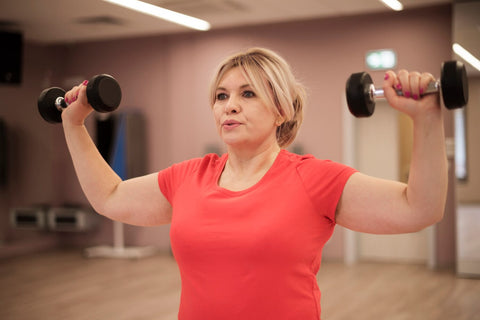Menopause is a stage in a woman's life that lasts more than 30 years and brings with it a series of physical and emotional changes.
One of the most common challenges during menopause is weight gain, a situation that many women find frustrating due to the great taboo and misinformation surrounding this stage of life.
However, with the right information, it's possible to cope with these changes in a healthy way. In this blog, we'll explore the reasons behind weight gain during menopause, as well as the most effective treatments and strategies to address it.
Weight gain and menopause
As you age, as you reach menopause, you may find that maintaining your normal weight becomes more challenging. Even if your diet and exercise routine remain the same, you may start to notice that your clothes are fitting tighter and the number on the scale begins to creep up.
75% of women experience weight gain during menopause. Weight gain often begins several years before menopause, during the period known as perimenopause .
Starting at age 40, estrogen levels begin to decline , coinciding with the onset of the premenopause phase . This is due to a progressive loss of ovarian function. Premenopause spans the ages of 40 to 45 and is the transition phase toward menopause, although menstruation is still regular.
We then enter perimenopause , between the ages of 45 and 55. During this stage, menstruation becomes intermittent as the ovaries gradually lose function. Contrary to popular belief, menopause is not the stage, but rather the day a woman has her last period . From that moment on, we enter postmenopause , in women over 55 years of age where menstruation is absent.
The reduction and loss of estrogen is the main cause of the characteristic symptoms of menopause, since the protective role it previously played is lost and hormonal balance is altered.
The reality of weight gain during menopause
Weight gain in women during middle age appears to be primarily related to chronological aging rather than menopause (ovarian aging) itself. What does appear to be a consequence of menopause is the redistribution of body fat .
This change is characterized by an accumulation of visceral fat in the trunk, which increases the waist circumference and transforms the figure from a "pear shape" (with fat stored in the hips and thighs) to an "apple shape" (with fat accumulated in the abdominal area).


At the metabolic level, there are alterations in insulin sensitivity , which decreases, making it more difficult to metabolize sugars , and changes in the lipid profile , such as an increase in triglycerides (substances similar to fat found in the blood), a decrease in good cholesterol (HDL), increasing the risk of heart attack and other health problems, and at the same time, an increase in bad cholesterol (LDL).
All of this contributes to an increased risk of diabetes, overweight, obesity , or metabolic syndrome . For more information on this syndrome, consult the menopause guide from the Spanish Association for the Study of Menopause (AEEM) .
Factors that make weight loss difficult
Why is it difficult to lose weight during menopause?
Losing weight during menopause can be more difficult than usual due to several factors that work against us:
- Hormonal Changes : As we mentioned, the decrease in estrogen and other hormones alters metabolism and promotes fat storage. Since estrogen influences appetite control and satiety , its decrease can slow metabolism and increase appetite. Therefore, women during this stage experience more brain signals of hunger, leading to higher calorie intake and weight gain.
- Muscle loss : Muscle mass tends to decrease with age, which in turn reduces the basal metabolic rate (the number of calories the body burns at rest).
- Decreased physical activity : Fatigue and other symptoms of menopause can decrease your motivation to stay active.
- Changes in appetite and sleep : Lack of sleep and increased stress can trigger cravings for unhealthy foods, further complicating the situation.
You can find much more detailed information in the AEEM menopause and obesity guide .
Nutrition during menopause
What should your diet be like during menopause?
Diet plays a crucial role in weight control during menopause. Adapting your diet to this new stage of life can make a difference in your well-being.
In addition, there are options that can help, such as the Resting Metabolism Study offered by Clínica Planas , which uses exclusive technology to identify which foods are more or less fattening for each person.
With this personalized approach, a diet and exercise plan can be designed that is perfectly tailored to each individual's needs , in a rigorous and safe manner.
The importance of a balanced diet
The concept of a quality diet is being replaced by that of anti-inflammatory nutrition , to counteract the low-grade inflammation associated with excess adiposity, a key factor during menopause and largely responsible for symptoms during the menopausal transition. This anti-inflammatory diet is similar to the Mediterranean diet pattern , which is characterized by:
- Absence of processed and refined foods ( pastries, soft drinks and sugary drinks, energy drinks, packaged juices, etc.)
- Consume abundant legumes, whole grains, vegetables, fruits and nuts such as walnuts, rich in Omega-3 .
- Consuming low-fat dairy products is essential for bone health. Calcium sources such as almonds, tahini, and cruciferous vegetables (broccoli, cauliflower, etc.) are very beneficial.
- Low consumption of red meat and meat products , with a predominance of protein from fish, poultry, and eggs . Increasing protein intake is key to preserving muscle mass.
- Use of virgin olive oil as a cooking fat and dressing. Scientific evidence indicates its benefits in preventing cardiovascular events, strokes, diabetes, and other conditions.
Weight loss treatments for menopause
Prioritizing an anti-inflammatory diet, combined with regular strength and aerobic exercise, is essential to facilitate weight loss. However, we can rely on treatments that offer an extra boost and help accelerate results .
Natural treatments
Madequa 100% Natural Supplements are formulated with gynecologists and pharmacists , are hormone-free and use high-quality ingredients at optimal and effective doses , adapting to the needs of women before, during and after menopause.
Don't worry if you don't know what stage you're in; you can take the Menopause Test to find out and learn what supplements to take.
Weight loss programs
The Clínica Planas Weight Loss Program is specifically designed for women looking to lose weight, offering a completely personalized and comprehensive approach that helps you lose weight safely and effectively . It uses a Metabolic Study , an advanced weight loss treatment that evaluates how your body uses calories, both at rest and during exercise. Based on these results, a personalized diet and exercise plan is designed .
They also offer body treatments such as electrotherapy, pressotherapy, radiofrequency, and LPG Endermologie, which help reduce localized fat, combat cellulite, and improve body tone.
Huber 360 technology is used for noninvasive silhouette shaping, complementing the 3-month weight-loss program that includes metabolic studies and supervised physical activity.
Losing weight during menopause can be challenging, but it's not impossible. The hormonal and metabolic changes of this stage require a personalized and conscious approach, including a balanced diet, regular exercise, and healthy lifestyle habits.
In addition, there are treatments that will help you achieve this, such as Madequa natural supplements and the Clínica Planas Weight Loss Program .
Your well-being is in your hands, and it's never too late to start prioritizing it.
References
Erdélyi A, Pálfi E, Tűű L, Nas K, Szűcs Z, Török M, Jakab A, Várbíró S. The Importance of Nutrition in Menopause and Perimenopause-A Review. Nutrients. 2023;16(1):27. doi:10.3390/nu16010027.
Davis SR, Pinkerton J, Santoro N, Simoncini T. Menopause-Biology, consequences, supportive care, and therapeutic options. Cell . 2023;186(19):4038-4058. doi: 10.1016/j.cell.2023.08.016.
Sarapis K, George ES, Marx W, Mayr HL, Willcox J, Esmaili T, Powell KL, Folasire OS, Lohning AE, Garg M, Thomas CJ, Itsiopoulos C, Moschonis G. Extra virgin olive oil high in polyphenols improves antioxidant status in adults: a double-blind, randomized, controlled, cross-over study (OLIVAUS). Eur J Nutr. 2022;61(2):1073-1086. doi:10.1007/s00394-021-02712-y.
Leeners B, Geary N, Tobler PN, Asarian L. Ovarian hormones and obesity. Hum Reprod Update. 2017;23(3):300-321. doi:10.1093/humupd/dmw045.
Pasquali R, Casanueva F, Haluzik M, van Hulsteijn L, Ledoux S, Monteiro MP, Salvador J, Santini F, Toplak H, Dekkers OM. European Society of Endocrinology Clinical Practice Guideline: Endocrine work-up in obesity. Eur J Endocrinol . 2020;182(1):G1-G32. doi: 10.1530/EJE-19-0893.
Myers CA, Mire EF, Katzmarzyk PT. Trends in Adiposity and Food Insecurity Among US Adults. JAMA Network Open . 2020;3(8):e2012767. doi: 10.1001/jamanetworkopen.2020.12767.
Knight MG, Anekwe C, Washington K, Akam EY, Wang E, Stanford FC. Weight regulation in menopause. Menopause. 2021;28(8):960-965. doi: 10.1097/GME.0000000000001792
Gold EB, Crawford SL, Avis NE, Crandall CJ, Matthews KA, Waetjen LE, Lee JS, Thurston R, Vuga M, Harlow SD. Factors related to age at natural menopause: longitudinal analyzes from SWAN. Am J Epidemiol. 2013;178(1):70-83. doi: 10.1093/aje/kws421.
Lizcano F, Guzmán G. Estrogen Deficiency and the Origin of Obesity during Menopause. Biomed Res Int . 2014;2014:757461. doi: 10.1155/2014/757461.
Menopause and obesity. AEEM MenoGuide. First edition: April 2022. karma et al, slu Barcelona 2022. ISBN: 978-84-09-40503-9.




Comments (1)
Com a calculadora de horas fica muito mais simples organizar trabalho, estudos e descanso. calculadora de horas con break